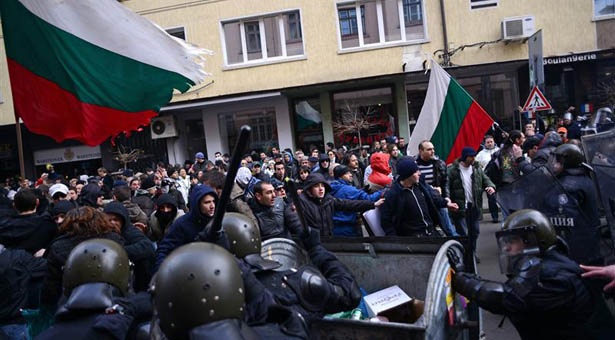On 20th of February, the Bulgarian liberal conservative government headed by Bojko Borissov resigned after weeks of social protests. This is very remarkable as Bulgaria does not have a recent history of strong social movements and protests. The protests have been provoked by the high prices and hefty electricity prices increases practiced by the privatised […]

On 20th of February, the Bulgarian liberal conservative government headed by Bojko Borissov resigned after weeks of social protests. This is very remarkable as Bulgaria does not have a recent history of strong social movements and protests.
The protests have been provoked by the high prices and hefty electricity prices increases practiced by the privatised energy companies. Three companies – two from the CzechRepublic, one from Austria – control the electricity industry in Bulgaria. Many people simply cannot cope with the electricity prices. Incomes are very low. The official unemployment has doubled since the beginning of the crisis from 5.7% in 2008 to almost 13% today. After a strong GDP decline of 5.5% in 2009, the Bulgarian economy has at best stagnated in the following years. In spite of this bad performance, Bulgarian austerity policies have been praised as a success story by liberal economists. Liberal partisans of Bulgarian austerity have particularly underlined the low level of public debt. The other side of this coin are expensive privatised social services and a deficient public service. According to recent Eurostat statistics, more than 40% of the Bulgarian population suffer from significant material deprivation. This is by far the worst record in the EU.
Protests did not only occur in the capital city, Sofia, but in other cities as well. Over recent days, they had become stronger. The (re-)nationalisation of the electricity companies was one of their demands. The governments announced that it will revoke the licence of the Czech electricity company CEZ which had been particularly severely criticised (and already lost its licence in Albania a few months ago). The Minister of Finance, Simeon Djankov, who is particularly closely associated with austerity policies, was the first minister to resign. However, this did not calm the protests. The following day, skirmishes between the police and protesters left a number of persons injured. More than two dozens persons had to be treated in hospital. After these events, the government which had been regard as being shaky for some time resigned. The practical consequences will be limited since elections are anyway due for summer. The symbolical impact, however, is high because a government was forced leave office due to social grievances and social protests.
Social protests have increased in other countries of the region as well. About a year ago, there were rather strong social protests in Romania. There have been a number of strikes in Serbia. Usually, these protests cannot rely on well organised social movements. Often, they have rather a local character. Slovenia which has seen a sustained wave of protests against austerity and corruption for more than three months is in some respects different from the social protests in other East European countries. The Slovenian trade union movement which is at the core of the Slovenian protest movement is relatively strong. It has already led successful campaigns, e.g. against the introduction of a flat tax and pension reform, in past years. It has not only relied on street protests and strikes, but it has used as well the instrument of binding referenda that does exist in Slovenia. In the past, the instrument of the referendum proved to be a powerful instrument. However, its recent attempt to launch a referendum initiative against the creation of a bad banks and initial steps towards the privatisation of state-owned banks was blocked by the constitutional court. Nevertheless, the governing right-wing coalition in Slovenia is disintegrating in the face of the sustained social protests. However, there is no left wing party in Slovenia which would really offer an alternative to austerity. And this limitation does not only exist in Slovenia.